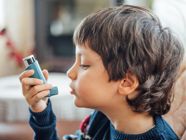What is pneumonia?
Pneumonia is a lung infection caused by bacteria, viruses, or fungi. Pneumonia causes swelling of the lung tissue and the accumulation of fluid or pus in it. Pneumonia can occur in one or both lungs. (1)
What are the symptoms of pneumonia?
The severity of pneumonia symptoms ranges from mild to severe, depending on the type of microorganism causing the infection, the age of the patient, and his or her general health condition. The symptoms of mild pneumonia may be similar to those of a cold or flu but last longer. (2)
Symptoms in adults
Symptoms of pneumonia in adults include all of the following: (3)
- Chest pain when breathing or coughing.
- Cough containing mucus or phlegm.
- Generalized fatigue and exhaustion.
- Fever.
- Sweating.
- Chills and body tremors.
- Nausea, vomiting and diarrhea.
- Shortness of breath.
- Mental confusion and changes in consciousness (usually in people older than 65 years).
- Hypothermia (usually in people over 65 years of age and those with a weakened immune system).
Symptoms in newborns and infants
Clear symptoms of pneumonia may not appear in newborns and infants, and in other cases parents notice a group of distinct symptoms, such as: (3)
- Vomiting.
- Fever.
- Cough.
- fatigue, exhausted, and without energy (apathy).
- Difficulty breathing.
- Having difficulty eating.
If you believe that you are suffering from symptoms of pneumonia, seek medical advice from one of our specialist doctors in the Pulmonary and Chest department at Al-Ahli Hospital. Our specialists will provide you with an accurate assessment of your condition and the health care you need.
What are the causes of pneumonia?
Pneumonia occurs when the lungs become infected with various types of microorganisms, such as: (4)
- Viruses, such as: respiratory syncytial virus, coronavirus, and influenza virus.
- Bacteria, such as: Streptococcus pneumoniae (Pneumococcus) and Mycoplasma Pneumoniae.
- Fungi: Fungi can be the cause of pneumonia, especially in those with weak immune systems.
Who are the high-risk individuals susceptible to pneumonia ?
Pneumonia is considered a disease that can affect anyone, but there are certain age groups and factors that make some individuals more susceptible to this pulmonary disease, including the following: (5)
- Age: infants under the age of two years, and geriatrics over the age of 65 years, are more susceptible to pneumonia, because their immunity is weaker than others.
- Place of work or residence: Individuals who live or spend most of their time in crowded places are more likely to transmit the infection to those around them and develop pneumonia.
- Smoking: Smoking reduces your body’s ability to get rid of the mucus accumulated in the airways.
- Admission to the hospital in a critical condition: requires admission to the intensive care unit (ICU) and/or the use of a mechanical ventilator.
- Pregnancy.
- Some chronic diseases: such as brain problems (strokes, dementia, Parkinson’s disease), AIDS, some chronic diseases of the respiratory system such as: (asthma, pulmonary fibrosis, chronic obstructive pulmonary disease (COPD)), sickle cell anemia, diabetes mellitus, Liver and kidney diseases and problems, and heart failure.
How is pneumonia treated?
Pneumonia is usually treated with antibiotics, and symptoms often begin to improve within 2-4 weeks in most patients. (6)
Some individuals are more susceptible to complications from pneumonia, so they need to stay in the hospital to receive intravenous antibiotics, intravenous fluids, and oxygen to help them breathe, including: (6)
- Geriatrics (those over 65 years of age).
- People with chronic heart or lung disease.
- Infants or young children.
- Those suffering from severe symptoms.
If the doctor gave you oral antibiotics and you do not feel any improvement or difference in your symptoms after 2-3 days, you should contact the doctor immediately to conduct further investigations and tests to determine the cause and appropriate treatment. (6)
Recommendations for pneumonia patients
If you have pneumonia, there are several tips that will speed up your recovery and reduce the chance of transmitting the infection to others, including the following: (6)
- Take adequate rest, try to stay at home throughout the illness and avoid contact with others, especially if you suffer from fever and lethargy.
- Drink enough fluids during the day.
- Take analgesics and antipyretics if you suffer from pain or fever.
- Cover your mouth and nose well with a tissue when you sneeze or cough and dispose of it immediately.
- Wash your hands with soap and water several times during the day.
- Do not use cough medicines; These medications stop coughing, which is the body's immune response to get rid of the infection.
- Do not smoke and try to stay away from smokers as much as possible.
References:
- https://my.clevelandclinic.org/health/diseases/4471-pneumonia
- https://www.mayoclinic.org/diseases-conditions/pneumonia/symptoms-causes/syc-20354204
- https://www.drugs.com/mcd/pneumonia
- https://www.cdc.gov/pneumonia/causes.html
- https://www.nhlbi.nih.gov/health/pneumonia/causes
- https://www.nhs.uk/conditions/pneumonia/






